With respect to Professor Jackacki’s hypothesis about James’ perspective, I have used Voyant tools to attempt to either affirm or deny that James shows a loss of innocence roughly halfway through our class transcription. The words I decided to utilize during my distant reading instilled upon me new questions.
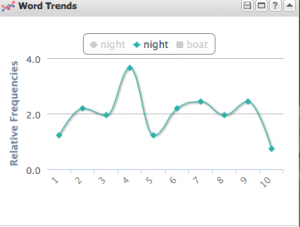 The first world I selected was “night.” This word appears 82 times throughout the text. As I clicked on the word in cirrus tool and viewed it on the word trends tool, I did not notice any patterns whatsoever. Especially during the time period Dr. J. addresses, there was a consistent frequency of the number of times night was used. It also did not appear to be too much different than the beginning diary transcripts, either. Distant reading using this word alone, did not help with Professor Jackacki’s research question.
The first world I selected was “night.” This word appears 82 times throughout the text. As I clicked on the word in cirrus tool and viewed it on the word trends tool, I did not notice any patterns whatsoever. Especially during the time period Dr. J. addresses, there was a consistent frequency of the number of times night was used. It also did not appear to be too much different than the beginning diary transcripts, either. Distant reading using this word alone, did not help with Professor Jackacki’s research question.
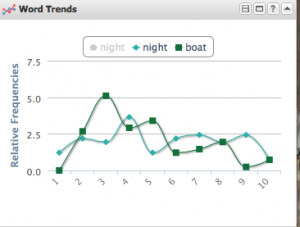 However, when I added a second word, “boat,” I noticed a distinct interesting. I noticed these two trends were almost mirror images of each other. There seemed to be a negative correlation between talking about night and talking about boats. Whenever Linn was talking about a boat, typically the Cossack, he did not seem to be mentioning night. This leads me to the question: when Linn is on board the Cossack, is he writing at night, therefore he does not mention night, or does all the action seem to talk place during daylight hours? Why does is there this strange relationship between “boat” and “night”?
However, when I added a second word, “boat,” I noticed a distinct interesting. I noticed these two trends were almost mirror images of each other. There seemed to be a negative correlation between talking about night and talking about boats. Whenever Linn was talking about a boat, typically the Cossack, he did not seem to be mentioning night. This leads me to the question: when Linn is on board the Cossack, is he writing at night, therefore he does not mention night, or does all the action seem to talk place during daylight hours? Why does is there this strange relationship between “boat” and “night”?
These two words do not necessarily reveal anything about Linn’s experience in battle. I just know that when talking about his boat, the Cossack, does not seem to have a correlation to his innocence or lack thereof. This plays out to be true when Linn mentions night. Unfortunately, I was unable to affirm or refute Professor Jackacki’s research question and hypothesis; yet, maybe other words will be able to. They do guide me towards the thought that Linn may have a pattern of the time he rights his diary entries.
I benefitted from using Voyant tools and feel that once I am able to come up with a better research question, I will be more successful with the program. Distant reading is a very intriguing concept and, although I was “unsuccessful” with the goal of getting to some type of conclusion over the accuracy of Professor Jackacki’s hypothesis, I have used this as an experience that can improve my skills in this field.
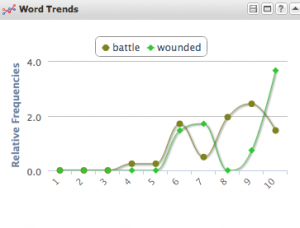


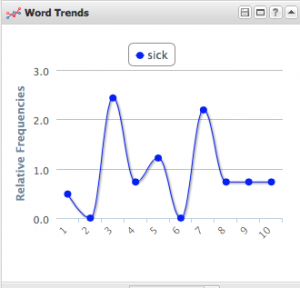 he very beginning. However, there are two huge peaks. If there was one peak in the center of this plot, then that would give pretty good evidence to support my hypothesis. Unfortunately this is not the case and the decrease that occurs in between the two peaks provides me with confusing data. Why was there a sudden decrease before Linn picked back up and starting writing more frequently again about sickness? Although I have a few questions about the data, it does show me that from the beginning to the end there is definitely an increase in Linn’s writing of illness. This increase might have been a factor that caused Linn’s perception to shift, however we cannot know for sure.
he very beginning. However, there are two huge peaks. If there was one peak in the center of this plot, then that would give pretty good evidence to support my hypothesis. Unfortunately this is not the case and the decrease that occurs in between the two peaks provides me with confusing data. Why was there a sudden decrease before Linn picked back up and starting writing more frequently again about sickness? Although I have a few questions about the data, it does show me that from the beginning to the end there is definitely an increase in Linn’s writing of illness. This increase might have been a factor that caused Linn’s perception to shift, however we cannot know for sure.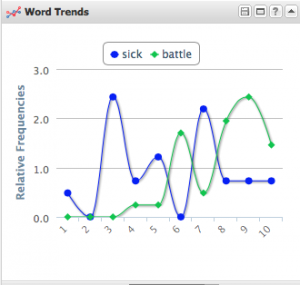 battle was hardly ever written about. There was a slow increase, followed by a huge peak. The peak appears roughly halfway through the entry which would support my hypothesis. Battle became a huge part of Linn’s writing at this point and stayed important to him throughout the rest of the time he was there. It seems that once Linn began to focus on battle, he could not stop writing about it. This trend provides me with pretty good evidence that something changed about halfway through his journals, and he had a shift in the material that he chose to write about. Both of these words have similar frequencies, sick appearing 35 times, and battle appearing 38 times. The word trend of both sick and battle shows me that both of these things became more and more prominent in his life, which illustrates a change. Although this prominence is not enough to prove my hypothesis, it does support it.
battle was hardly ever written about. There was a slow increase, followed by a huge peak. The peak appears roughly halfway through the entry which would support my hypothesis. Battle became a huge part of Linn’s writing at this point and stayed important to him throughout the rest of the time he was there. It seems that once Linn began to focus on battle, he could not stop writing about it. This trend provides me with pretty good evidence that something changed about halfway through his journals, and he had a shift in the material that he chose to write about. Both of these words have similar frequencies, sick appearing 35 times, and battle appearing 38 times. The word trend of both sick and battle shows me that both of these things became more and more prominent in his life, which illustrates a change. Although this prominence is not enough to prove my hypothesis, it does support it.